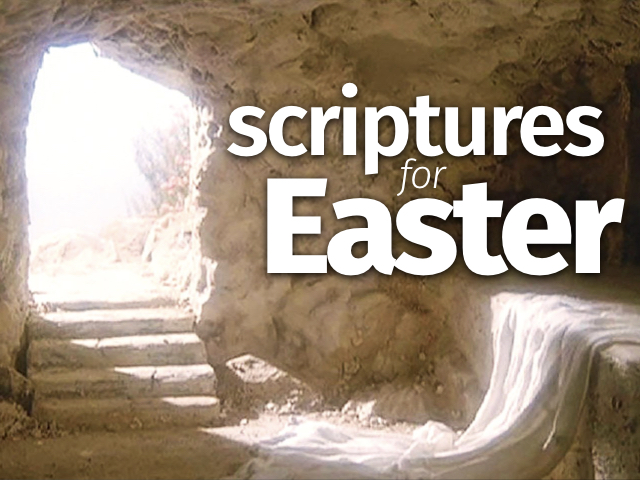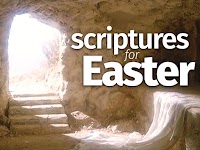
Luke 24.28-35.
They told him they expected Jesus the Nazarene to be Israel’s redeemer, but he was arrested and crucified.
Luke 24.28-35 KWL - 28 They come near the village where they’re going,
- and Jesus makes like he’s going to go on further.
- 29 The students force Jesus to come with them, saying,
- “Stay with us, for it’s near evening and the day’s already over.”
- So he goes into the village and stays with them.
- 30 It happens while Jesus reclines with the students at dinner:
- Taking the bread, he blesses it, breaks it, and gives it to them.
- 31 The students’ eyes are opened, and they recognize Jesus
- —and he becomes invisible to them.
- 32 The students tell one another, “Weren’t our hearts burning within us
- when he was speaking to us on the road?
- when he was opening up the scriptures to us?”
- 33 Rising up that same hour, the students return to Jerusalem.
- They find the Eleven and those with them, having gathered together,
- 34 and are saying this: “The Master is risen indeed,
- and appeared to Simon!”
- 35 The students are telling the other students
- what happened on the road,
- and when they recognized Jesus in the breaking of bread.
Every once in a while, some Christian balks at when Jesus
First of all, why wasn’t Jesus gonna go further? You recall in Matthew the angels, and soon after Jesus himself, told the women, “Tell the boys I’ll see them in the Galilee”?
But circumstances change. The students
I should also add Jesus has every right to test his followers; to tell them he’s gonna do one thing, but what he’s hoping is they’ll talk him out of it so he doesn’t have to do that. Just like when the L
Recognizing him at dinner.
The customs of middle eastern hospitality meant it was really likely Jesus’s students would invite him home anyway. They just made a new friend on the road; you don’t wanna travel the roads at night because highwaymen; it’s getting late; come have dinner. There’d be bread, at least. It’d be unleavened, ’cause the Feast of Unleavened Bread was still happening, but food is food.
Now they’d just had dinner with Jesus a few nights ago at Passover, at his Last Supper. In which Jesus did the very same thing he did here: Broke the bread and passed it around. During Passover, this was part of the
There is some question a lot of Christians have about whether Jesus deliberately, supernaturally kept them from recognizing him on the road. I’ve heard it argued he had to do this, ’cause he wanted them to pay attention and listen to his teachings about who Messiah is and what he had to do—and if they knew it was Jesus, they’d be too busy doing happy dances to listen. Or they’d run away, ’cause they had to tell everybody! Or some other reason. Thing is, in the very next story, Jesus appears to the Eleven, makes ’em fully aware it’s really him and he’s really alive…
I suspect it’s more like they weren’t expecting Jesus at all, and even the students thought throughout, “Man alive, this guy totally sounds like Jesus,” it still wouldn’t have occurred to them it actually is Jesus. Same as
I also suspect that’s most of the reason this story’s in the bible: Because it still happens. And though it’s gonna freak us out when it happens, don’t get the idea it’s without biblical precedent. It’s absolutely not. Happened right here.
Running to tell the others.
Most of the time when we retell this story, people describe these students as getting up immediately and running back to Jerusalem to tell the other students.
And you’ll notice this story doesn’t say they ran. Or that they left immediately. They got up and left
The students got back to Jerusalem and found the Eleven, plus the other Jesus-followers, gathered together. So that gives us three options:
- They got horses, rode back to Jerusalem before 8, and met with the Eleven, who happened to be up late. (’Cause 8 o’clock was late back then.)
- They walked, got back to Jerusalem by about 11 or midnight, and the Eleven happened to be pulling an all-nighter.
- They walked, got to Jerusalem by about 11 or midnight, went to bed, and met with the Eleven in the morning.
The way Luke phrases verse 34, it could either mean the Eleven were saying, “The Master appeared to Simon,” or the two students from Emmaus were saying “The Master appeared to Simon.” Historically, Christians figured the Eleven were saying it, and the “Simon” in question was Peter. There seems to be some special appearance to Peter which Paul lists in
My theory—but it’s purely a theory; take or leave it—is it’s the two students from Emmaus speaking, and they’re speaking of themselves. Jesus had appeared to them. But for whatever reason, they were emphasizing just the one of them, Simon: One of the students is identified as Cleopas,
Anyway, other scholars have the same theory, but more people think the premise is weak: Referring to the two of themselves as just “Simon” seems odd. Then again, referring to a special appearance to Peter, yet not calling him Peter (to distinguish him from the other guys among them named Simon; the whole reason Judeans and Galileans used nicknames was because so many of ’em had the same names!), likewise seems odd. Shouldn’t there be a whole story about it in the gospels?—and yet there’s nothing about an appearance to Peter. So I’m gonna vote for this Simon being Simon bar Cleopas. We’ll sort it out precisely after the resurrection, I guess.
Ah, but this story isn’t over. Next, Jesus shows up.

